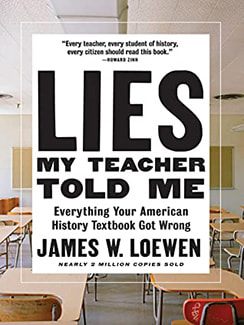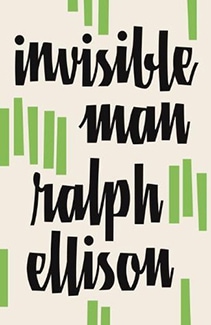I have an affiliate relationship with Bookshop.org and Malaprop's Bookstore in beautiful Asheville, NC. I will earn a small commission at no additional cost to you if you purchase merchandise through links on my site. Read more on my affiliate page.

Title: Lies My Teacher Told Me: Everything Your American History Textbook Got Wrong (2018 edition)
Author: James W. Loewen
Genre: History, Social Issues
Audience: Adult
Format: E-book
My Synopsis:
In 1995, James W. Loewen, who holds a PhD in sociology, read twelve of the most popular American history textbooks at the time and critiqued them for accuracy and inclusiveness. In 2007, he read another six textbooks and revised his original work accordingly. He published an edition with a preface about the era of “fake news” in 2018.
The main body of the book presents highlights of American history as told in the textbooks and then details exactly how the author feels they are wrong or misleading and presents an alternative version that could be included instead. In later chapters, Dr. Loewen explains how textbooks have come to this state and how damaging these books are to minority students in the short-term and American culture as a whole in the long-term. He also explores the world of textbook publishing and selection and how political that process is.
My Review:
Hmmm…. Where to start? I mostly found this book fascinating and the inaccurate history we are taught infuriating but I also had problems with the tone. I’ll start with the positives.
One of my high school classmates recommended this book on Facebook and that opened a discussion about how abysmal the history department in our school was. I don’t have any complaints about any other aspect of my high school education but my foundation in history is almost nonexistent. It wasn’t even that my teachers were teaching lies; it was that they didn’t teach at all. College wasn’t much better. I was a biology major and I don’t think I took any true history classes. My humanities classes included history but as far as a class that had “History” in the title? I truly don’t remember one.
But being a reader with varied tastes, I have absorbed some history over the years. I don’t generally seek out history books but sometimes a title will capture my attention and I’ll pick it up. I do read quite a bit of historical fiction, which can be informative, but sometimes it’s misleading too. Anyway, not all of Loewen’s facts were new to me but a surprising number were.
Loewen’s main complaint is that our American history textbooks invariably teach from the point of view of White males of European descent. The textbooks also never criticize US policies and in fact teach that we’re the best and only getting better. Even the titles of the textbooks reflect this, with examples like Triumph of the American Nation and The Challenge of Freedom.
Beginning with Columbus (I believe none, or very few, of the books address pre-Columbian history) and his “discovery” of the Americas, there’s almost never a negative word. According to our textbooks, everything Americans have ever done has been for the betterment of all mankind.
Needless to say, no country is perfect. But where other countries might acknowledge mistakes and make an attempt to learn from them, the US rewrites history or reframes the problem to make ourselves look good. And so today, the Civil War is touted ad nauseum as being about States’ Rights instead of slavery, despite the fact that South Carolina’s Declaration of Secession is riddled with complaints about northern states failing to support the institution of slavery.
“A geographical line has been drawn across the Union, and all the States north of that line have united in the election of a man to the high office of President of the United States, whose opinions and purposes are hostile to slavery. He is to be entrusted with the administration of the common Government, because he has declared that that ‘Government cannot endure permanently half slave, half free,’ and that the public mind must rest in the belief that slavery is in the course of ultimate extinction.”
Confederate States of America – Declaration of the Immediate Causes Which Induce and Justify the Secession of South Carolina from the Federal Union
How much clearer can this issue be? And yet it’s something we still argue about to this day, 160 years later.
By failing to teach about the achievements and accomplishments of minority groups or women, the books alienate and exclude those same groups. Essentially, they’re implying that if you aren’t a White male of European descent, you have nothing to contribute. Your ancestors didn’t contribute anything and you won’t either. Everyone needs role models. Our textbooks completely fail to deliver them for broad swaths of the population.
The publishing and textbook selection chapters started to bog me down, but the entire process has very little accountability. The authors on the cover of any given textbook probably haven’t even read any of the book, much less written it. Freelancers who might or might not have a background in history write updates. Those same freelancers might work for multiple publishing companies so entire paragraphs are identical from one book to the next.
Every state has different textbook selection procedures but, as with most things in the US, the process is typically very political. The teachers who are going to be using the book rarely have a say in selection. No one reads the books and at best just flip through. That’s led to a serious problem of appearance overriding content over the past couple of decades. In 2007, Dr. Loewen writes that some books are almost unreadable because of all the boxes and irrelevant pictures and graphics that don’t illustrate much of anything but they sure look nice. He frequently mentions that Texas chooses books that are used statewide. That gives them huge power over the textbook publishing world. Why write a textbook that typically-conservative Texas obviously isn’t going to like and knowingly give up that source of revenue?
But the problems are more varied. There aren’t very many history majors in college at this point. And why would there be when so many of us share the same lackluster memories of our history classes? So coaches and teachers with other backgrounds are coerced into teaching history. With no formal background to draw from, they invariably teach straight from the book. Even teachers with a solid history background face pushback from parents and administrators if they start teaching history that is contrary to the established mythos.
I could go on but I’ll try to wrap this up.
My one big complaint, and it was big for me, is that the tone of the entire book is combative. I personally avoid confrontation at almost any cost and Dr. Loewen is strident in his criticism of these textbooks and the authors. He even names names. To be fair, he did contact some of the authors whose names are on the cover and confront them with, “Is this accurate? No? Then why is it in the book with your name on it?” So they had a chance to voice their opinions, but again, it came across as very confrontational. I even find the title to be antagonistic so I don’t know why this came as a surprise to me but it did.
The author himself had a very negative experience with publishing a history textbook, but he discloses that very early on. Somehow, the tone of this book came across as having… sour grapes? Don’t get me wrong. He published a history of the state of Mississippi and directly addressed its racist history. Of course Mississippi didn’t adopt the book. Dr. Loewen took the state to court and won a landmark case about free speech. Knowing this, I sometimes felt that the author was making a case of “This tripe can get published and selected but my book wasn’t?” He has a point but it still left a little bit of a negative taste in my mouth.
Overall, the book was eye-opening. I learned a lot of history that was completely new to me. I checked it out from the library but I really wish I’d had my own copy. There’s a huge wait list so I felt rushed to finish it. I would have liked to take my time and chew over everything I was learning. I don’t know how much appeal this would hold outside the US but readers who are open to new ideas, and especially teachers, should give this one a try.
Similar Books:
If you liked Lies My Teacher Told Me: Everything Your American History Textbook Got Wrong, you might also like my review of
- The Soul of America: The Battle for Our Better Angels by Jon Meacham
A similar book that I’ve read and recommend but haven’t reviewed is
Purchase:
Buy Lies My Teacher Told Me: Everything Your American History Textbook Got Wrong from Malaprop’s Bookstore in Asheville, NC.
I have an affiliate relationship with Malaprop’s Bookstore/Cafe in beautiful Asheville, NC. I will earn a small commission at no additional cost to you if you purchase merchandise through links on my site.





12 Comments
I’ve been hearing about this book for years and yet still haven’t gotten to it. It sounds really worthwhile though! I’m sure I’d find the process by which textbooks are selected infuriating, but better to know so we can advocate for change.
Exactly! I shouldn’t be surprised politics play so heavily into the textbook selection process yet I was.
I find this very interesting as we’ve gone through a similar situation in South Africa. The history that I’ve done at school is not even almost the history they are doing now!
Strange how much that influence the whole outlook on what we consider as history.
It’s interesting how much our view of history informs our view of current events as well. If we Americans are taught that the US has never made a mistake, we’re more likely to think that our actions in the present are the correct actions too.
I read this book years ago (20?) so I no longer remember much about his tone. But textbooks have changed a lot since it was written, and since I was in high school. Last year my younger kid took AP US History, and I wound up reading a LOT of the textbook aloud with her (she does better with hearing than with reading, and we took turns at sections, and I would sometimes stop and talk about something). My oldest also took US History with a different textbook, that I also saw a lot of. So I can tell you — those textbooks did not glamorize American history; if anything, they tried to do the opposite. There was quite a lot about women, minorities, and LGBT people. I learned a whole lot about Native American history that I didn’t know before, and a lot about arguments over race issues/institutional racism.
I was sometimes pleasantly surprised that the text was only pretty dang boring and not tortuously boring. But holy cow, I think they wrote it with the idea that they should never use a 10-cent word when a two-dollar word would do. Maybe they figured that a kid taking APUSH should have a massive vocabulary, I don’t know, but it was unnecessarily wordy.
Now, I live in California, so the textbooks approved for our state are required to have all that material. California and Texas pretty much control the textbook industry, and there are often two editions to meet the different requirements.
Curious. I would like to see how California versions differ from Texas versions. I bet there’s a huge difference. That does everyone a disservice. But publishers have to make money so until officials accept better-balanced ideas of teaching history, the practice will probably continue.
Hmm, that’s interesting that the tone on this one seems so angry. I’ll probably wait on it for now, though I might come back to it later. I just ordered An Indigenous Peoples’ History of the United States by Roxanne Dunbar-Ortiz, so I’m hoping that will fill in some gaps in my history knowledge.
My high school history teachers likewise weren’t “bad,” but they were teaching from the generic curriculum which left out just about anything that made the USA look bad. And we always focused so much more on ancient history than recent history, so there are so many relevant things that we never learned about in school. It’s really frustrating to me that we are all ending up having to teach ourselves history.
The tone could very well be my own projections. Gofita said in her comment above that she didn’t feel the same way. It is an excellent book. I think you could read the introduction and know if you feel the same way I do or not.
Your complaint about your history teachers is the exact complaint that the author addresses. Aren’t there depressing statistics about how many Americans never read another book in their lives after finishing high school? And how many of those who do read never pick up a history book? These textbooks are letting our population down in a lot of ways.
I’ll have to look for An Indigenous Peoples’ History.
The thing that was the most frustrating to me was that my US history teacher was a good teacher. I blame the textbook and school requirements more for the lack of good knowledge than the teacher. I remember that she had some great lesson ideas, and was able to present both sides of a situation well. But when the curriculum is set up to focus more on the founding of our nation rather than its recent past, we lose so much even with good teachers.
That would be frustrating. My teachers were just terrible. Loewen presented this situation in his book too. Between these textbooks and expectations from parents, administrators, and even students, good history teachers have a hard time teaching accurate history.
Interesting! I didn’t get the sour grapes idea from him at all. Usually authors don’t get a say in the title sometimes. Publishers like to make them more controversial to get sales but I don’t know if that’s the case with Loewen’s book. But maybe that really was his take. Why wasn’t his history book allowed in but all the others that are crap are? Interesting take. Very thorough review and great review! I’m so lazy so I don’t go in-depth with a lot of stuff. But I’m glad you did. Thanks for sharing!
1491 has been on my list. I started reading a few years ago and kind of skimmed but I’ve been wanting to read it in-depth this year. And I just picked up Jon Meacham’s book as well.
I’m so very bad at anything that even looks like confrontation (Haggling over car prices? Asking for a raise? Forget it.) that it could just be me being overly sensitive to something like that. I just can’t imagine calling up someone and being like, “That textbook with your name on the cover? I know you didn’t write it. Did you know that it has all these lies?” It was something that needed to be done for completeness and even fairness, to give them a chance to rebut what he says, but came across as a bit harsh to me personally.
1491 was eye-opening. Loewen touched the tip of that iceberg when he gave the numbers of Native Americans living in Haiti when Spaniards arrived versus 50 years later but there was so much detail in 1491 that I’d never heard before. I hope you enjoy it and The Soul of America when you get to them!